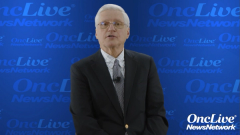
Review of Recent Data on ctDNA From ASCO 2022
A comprehensive review of data presented at ASCO 2022 on ctDNA and MRD detection in NSCLC.
Review of Recent Data on ctDNA from ASCO 2022
Mark G. Kris, MD, FASCO: So, the abstract by Dr. Lebow looks at the use of ctDNA, circulating tumor DNA, in patients that have been treated with radiation, or simultaneous chemotherapy and radiation. And one important thing about the assay that was used in that abstract is it’s so called tissue-informed tumor-informed us some did some DNA tests in the blood, just look for DNA. In these tests, you ideally know what mutations are present in that patient's tumor, and you look for those mutations. And when you know exactly what mutations you look for, it is easier to be more precise in finding those mutations. So, if you look for every mutation, it's not as good as honing in with very precise measurements for certain number of mutations. So, what they saw in that abstract, what we saw in that abstract, is that you could use this DNA measurement as a marker of the presence or the recurrence of the cancer. And they were able to show there that if the cancer was destined to return based on the standard CAT scanning that we do, you could probably find the return of cancer months earlier if you use the circulating tumor DNA.
So, there were two abstracts in the ASCO meeting in 2022 that look at using circulating tumor DNA at the time of an after surgery, so the idea is before surgery after surgery then to monitor them. I think both of these abstracts, talk about the possibilities that this could improve care and some of the limitations as well. The first is that not every patient has the enough circulating tumor DNA to permit ongoing monitoring. The second thing that happens is that after you treat a patient, either with a new adjuvant therapy or surgery, the number of people with the DNA goes down, because many of them, you know, have disappearance of the DNA. So, I think what both of these abstracts show is you could use disappearance of the DNA as a sign of the effectiveness of therapy and going forward, the return of the DNA could be used as a measure of return of the cancer. The other very interesting observation made in the abstract by Dr. Lee, was that you could monitor the effects of adjuvant therapy, potentially by looking at ctDNA. So, one of the difficulties is, in treating people after surgery, they're cancer free by every test that we have-- they have a negative PET scan, and the negative CAT scan, the surgeon has explored them and not found any cancer. And you don't really know for sure, if an adjuvant treatment is going to help that patient, we know that adjuvant treatment helps populations of patients in that situation, but we can't prove it helps that patient. So, what we would love to do is have a test that could say that this medicine you're administering as adjuvant treatment, is helping that patient and the ctDNA is a way to do that. And in the abstract by Dr. Lee, that were able to show, admittedly in a small number of patients, that as you gave adjuvant therapy, it, the ctDNA went away. So, that gives a lot of comfort that the treatment you're giving is effective. I think all of us are troubled by giving adjuvant therapy to every single patient because some of those people are already cured. And so, you're subjecting them to the side effects the inconvenience of a treatment and the fact is an unnecessary treatment, if they're already cured. If we had some way to prove that, then we wouldn't have to do treat them with an adjuvant therapy. That's the hope of ctDNA. Now, all the abstracts are truly in a relatively small number of patients. They're more thought provoking than practice changing at this time. But I believe it they point a direction to use ctDNA in the monitoring of patients, and particularly using the so-called tumor informed cell-free DNA testing, where you're looking for mutations that are specific to that patient's tumor.







































